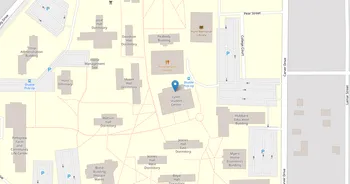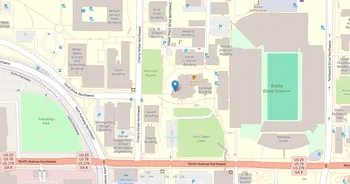Emory University : Overview, Courses, Scholarships & Rankings
About Emory University
Set in a leafy preserve yet a quick hop to intown Atlanta, Emory University balances quiet focus with city energy. It's known for strengths in the liberal arts, the life and health sciences, and the social sciences. Students find light filled libraries, modern labs, an on campus museum, and supportive advising, tutoring, wellness and career services. The vibe leans thoughtful and collaborative, with faculty who prize discussion and careful inquiry.
Clubs, service projects, a busy arts scene, intramurals, and wooded trails keep life full after class. Career prep runs practical, with research options, community partnerships, and alumni connections across the region. Atlanta adds internships in business, media, startups, and public health, plus food and music around every corner. A quirky tradition features a mysterious skeleton figure who sometimes grants class reprieves. Notable names tied to the place include the Indigo Girls, Sam Nunn, and Bernice King.
Key Institutional Details
Contact & Profile
Academic & Institutional
Academic Programs & Fields of Study
Emory University offers 112 degree programs across 22 major academic fields, graduating approximately 5,285 students annually. The most popular fields by graduate volume are Health (22 programs, 1,147 graduates), Business (6 programs, 953 graduates), Biological Sciences (7 programs, 699 graduates), Social Sciences (7 programs, 631 graduates) and Law (3 programs, 334 graduates). Explore program details, award levels, and graduate demographics below.
Health (22 programs, 1,147 graduates)
Healthcare Professions, Medical Sciences and Clinical Practice
| Program Name | Graduates | Gender Distribution | Award Levels | CIP Code |
|---|---|---|---|---|
| Registered Nursing | 537 |
|
Bachelor's
Master's
Post-Master's
|
51.3801 |
| Medicine | 134 |
|
Doctorate (P)
|
51.1201 |
| Physical Therapy | 63 |
|
Doctorate (P)
|
51.2308 |
| Environmental Health | 61 |
|
Master's
Doctorate (R)
|
51.2202 |
| Physician Assistant | 50 |
|
Master's
|
51.0912 |
| Nursing Practice | 48 |
|
Master's
Post-Master's
Doctorate (P)
|
51.3818 |
| Public Health Education and Promotion | 37 |
|
Master's
|
51.2207 |
| Family Practice Nursing | 37 |
|
Master's
|
51.3805 |
| Anesthesiologist Assistant | 35 |
|
Master's
|
51.0809 |
| International Public Health | 22 |
|
Master's
|
51.2210 |
| Health Services Administration | 21 |
|
Master's
Doctorate (R)
|
51.2211 |
| Nurse Anesthesia | 15 |
|
Doctorate (P)
|
51.3804 |
| Nurse Midwifery | 15 |
|
Master's
|
51.3807 |
| Women's Health Nursing | 14 |
|
Master's
|
51.3822 |
| Medical Science | 13 |
|
Master's
|
51.1401 |
| Nursing Science | 10 |
|
Master's
Doctorate (R)
|
51.3808 |
| Pediatric Nursing | 9 |
|
Master's
|
51.3809 |
| Medical Radiologic Technology | 8 |
|
Bachelor's
|
51.0907 |
| Bioethics and Medical Ethics | 8 |
|
Master's
|
51.3201 |
| Maternal and Child Health Nursing | 8 |
|
Master's
Post-Master's
|
51.3806 |
| Public Health | 1 |
|
Postbac Cert.
|
51.2299 |
| Emergency Room and Trauma Nursing | 1 |
|
Master's
|
51.3816 |
Business (6 programs, 953 graduates)
Business Administration, Marketing and Entrepreneurship
| Program Name | Graduates | Gender Distribution | Award Levels | CIP Code |
|---|---|---|---|---|
| Management Science | 744 |
|
Bachelor's
Master's
Doctorate (R)
|
52.1301 |
| Management Sciences and Quantitative Methods | 140 |
|
Bachelor's
Master's
|
52.1399 |
| Business Administration and Management | 57 |
|
Bachelor's
Master's
|
52.0201 |
| Business Administration | 4 |
|
Doctorate (R)
|
52.0101 |
| Accounting | 4 |
|
Bachelor's
|
52.0301 |
| Accounting and Business Management | 4 |
|
Master's
|
52.0305 |
Biological Sciences (7 programs, 699 graduates)
Life Sciences, Biotechnology and Biomedical Research
| Program Name | Graduates | Gender Distribution | Award Levels | CIP Code |
|---|---|---|---|---|
| Biology and Biological Sciences | 216 |
|
Bachelor's
|
26.0101 |
| Neuroscience | 172 |
|
Bachelor's
|
26.1501 |
| Epidemiology | 159 |
|
Master's
Doctorate (R)
|
26.1309 |
| Biomedical Sciences | 76 |
|
Master's
Doctorate (R)
|
26.0102 |
| Biostatistics | 59 |
|
Master's
Doctorate (R)
|
26.1102 |
| Genetics and Medical Genetics | 13 |
|
Master's
|
26.0806 |
| Biophysics | 4 |
|
Bachelor's
|
26.0203 |
Social Sciences (7 programs, 631 graduates)
Sociology, Anthropology and Political Science Studies
| Program Name | Graduates | Gender Distribution | Award Levels | CIP Code |
|---|---|---|---|---|
| Research and Quantitative Methods | 221 |
|
Postbac Cert.
Master's
Doctorate (R)
|
45.0102 |
| Econometrics and Quantitative Economics | 142 |
|
Bachelor's
Master's
Doctorate (R)
|
45.0603 |
| Political Science and Government | 89 |
|
Bachelor's
Master's
Doctorate (R)
|
45.1001 |
| Anthropology | 75 |
|
Bachelor's
Master's
Doctorate (R)
|
45.0201 |
| Sociology | 64 |
|
Bachelor's
Master's
Doctorate (R)
|
45.1101 |
| International Relations | 27 |
|
Bachelor's
|
45.0901 |
| Development Economics and International Development | 13 |
|
Master's
|
45.0604 |
Law (3 programs, 334 graduates)
Legal Studies, Jurisprudence and Professional Law Practice
| Program Name | Graduates | Gender Distribution | Award Levels | CIP Code |
|---|---|---|---|---|
| Law | 290 |
|
Doctorate (P)
|
22.0101 |
| Legal Research and Professional Studies | 25 |
|
Master's
|
22.0299 |
| Advanced Legal Research and Studies | 19 |
|
Master's
Doctorate (R)
|
22.0201 |
Mathematics (5 programs, 210 graduates)
Mathematical Sciences, Statistics and Computational Analysis
| Program Name | Graduates | Gender Distribution | Award Levels | CIP Code |
|---|---|---|---|---|
| Statistics | 135 |
|
Bachelor's
|
27.0501 |
| Mathematics and Statistics | 25 |
|
Bachelor's
|
27.0503 |
| Mathematics | 20 |
|
Bachelor's
Master's
Doctorate (R)
|
27.0101 |
| Applied Mathematics | 17 |
|
Bachelor's
|
27.0301 |
| Mathematics and Statistics | 13 |
|
Bachelor's
|
27.9999 |
Physical Sciences (4 programs, 199 graduates)
Chemistry, Physics and Earth Sciences Research
| Program Name | Graduates | Gender Distribution | Award Levels | CIP Code |
|---|---|---|---|---|
| Chemistry | 157 |
|
Bachelor's
Master's
Doctorate (R)
|
40.0501 |
| Physics | 28 |
|
Bachelor's
Master's
Doctorate (R)
|
40.0801 |
| Physical Sciences | 10 |
|
Bachelor's
|
40.0101 |
| Astronomy and Astrophysics | 4 |
|
Bachelor's
|
40.0299 |
Psychology (2 programs, 175 graduates)
Psychological Sciences, Mental Health and Behavioral Studies
| Program Name | Graduates | Gender Distribution | Award Levels | CIP Code |
|---|---|---|---|---|
| General Psychology | 166 |
|
Bachelor's
Master's
Doctorate (R)
|
42.0101 |
| Cognitive Psychology and Psycholinguistics | 9 |
|
Bachelor's
|
42.2701 |
Theology (6 programs, 143 graduates)
Theological Studies, Ministry Preparation and Religious Leadership
| Program Name | Graduates | Gender Distribution | Award Levels | CIP Code |
|---|---|---|---|---|
| Divinity and Ministry | 106 |
|
Master's
Doctorate (P)
|
39.0602 |
| Theological Studies | 31 |
|
Master's
|
39.0601 |
| Pastoral Counseling and Specialized Ministries | 2 |
|
Master's
|
39.0799 |
| Theology and Religious Vocations | 2 |
|
Master's
|
39.9999 |
| Religious Education | 1 |
|
Master's
|
39.0401 |
| Pastoral Counseling | 1 |
|
Master's
|
39.0701 |
Computer & IT (2 programs, 135 graduates)
Computer Science, Information Technology and Cybersecurity
| Program Name | Graduates | Gender Distribution | Award Levels | CIP Code |
|---|---|---|---|---|
| Computer Science | 131 |
|
Bachelor's
Master's
Doctorate (R)
|
11.0701 |
| Informatics | 4 |
|
Master's
|
11.0104 |
Admission Requirements & Test Scores
Comprehensive overview of admission criteria, standardized test score ranges, and application requirements for prospective students at Emory University.
Application Requirements
Data based on IPEDS for 2022-2023 academic year. Test score ranges represent the middle 50% of admitted students (25th-75th percentile). Requirements may vary by program.
Tuition, Fees & Estimated Costs
Overview of tuition rates, housing, and other annual education expenses for undergraduate and graduate students
Financial Aid & Student Support
Summary of scholarships, grants, student loans, and financial aid statistics for undergraduate students
Student Success Metrics
Graduation rates and post-graduation earnings to help assess student outcomes and long-term value of education.
Loan Burden & Repayment Outcomes
Breakdown of loan repayment rates and student debt levels by income and dependency status.
Frequently Asked Questions
Find answers to the most common questions about Emory University
How much does it cost to attend Emory University?
The annual tuition at Emory University is $60,774 for in-state students. When including room and board, books, and other expenses, the total estimated cost is approximately $83,622 for in-state students. Additional costs include room and board $18,972 and books and supplies $1,250.
Data based on IPEDS program completions for 2022-2023 academic year. Tuition and cost estimates are approximate and may not include all fees, personal expenses, or transportation costs.
What academic programs and degree levels does Emory University offer?
Emory University offers 112 academic programs across 22 major fields of study, with available degree levels: Bachelor's, Postbac Cert., Master's, Post-Master's, Doctorate (Research), Doctorate (Professional).
Most popular program areas include:
- Healthcare Professions, Medical Sciences and Clinical Practice (22 programs)
- Business Administration, Marketing and Entrepreneurship (6 programs)
- Life Sciences, Biotechnology and Biomedical Research (7 programs)
- Sociology, Anthropology and Political Science Studies (7 programs)
- Legal Studies, Jurisprudence and Professional Law Practice (3 programs)
Data based on IPEDS program completions for 2023-2024 academic year. Numbers reflect programs where students graduated, not all offered programs.
What is the acceptance rate for Emory University?
Emory University has an 11.1% acceptance rate and a 40.2% yield rate, making it highly selective.
Admission statistics breakdown:
- Total applicants: 31,929
- Students admitted: 3,543
- Students enrolled: 1,426
Data based on IPEDS for 2022-2023 academic year. Admission statistics may vary by program and application cycle.
What financial aid and scholarships are available at Emory University?
Emory University provides financial aid to 20% of first-time, full-time students, with average grants of $50,828 and average loans of $10,420.
Average financial aid amounts by type:
- Pell grants: $5,954
- State/Local grants: $6,646
- Institutional grants: $48,648
- Federal loans: $5,180
The university supports 652 students with grants and 164 students with loans annually.
Data based on IPEDS for 2022-2023 academic year. Financial aid amounts and percentages may vary by program, enrollment status, and individual circumstances.
What is the average salary for Emory University graduates?
Emory University graduates earn a median salary of $74,980 after 6 years and $80,137 after 10 years.
The salary range 10 years after graduation spans from $57,523 (25th percentile) to $120,080 (75th percentile), with top earners reaching $135,900 (90th percentile).
Data based on IPEDS for 2022-2023 academic year. Salary data reflects graduates who received federal financial aid (approximately 60% of all graduates). Actual earnings may vary significantly based on program, location, and individual circumstances.
Related Universities




Found something useful? Help others discover it too! Share with friends, on social media, or save for later - every share helps someone find the information they need.